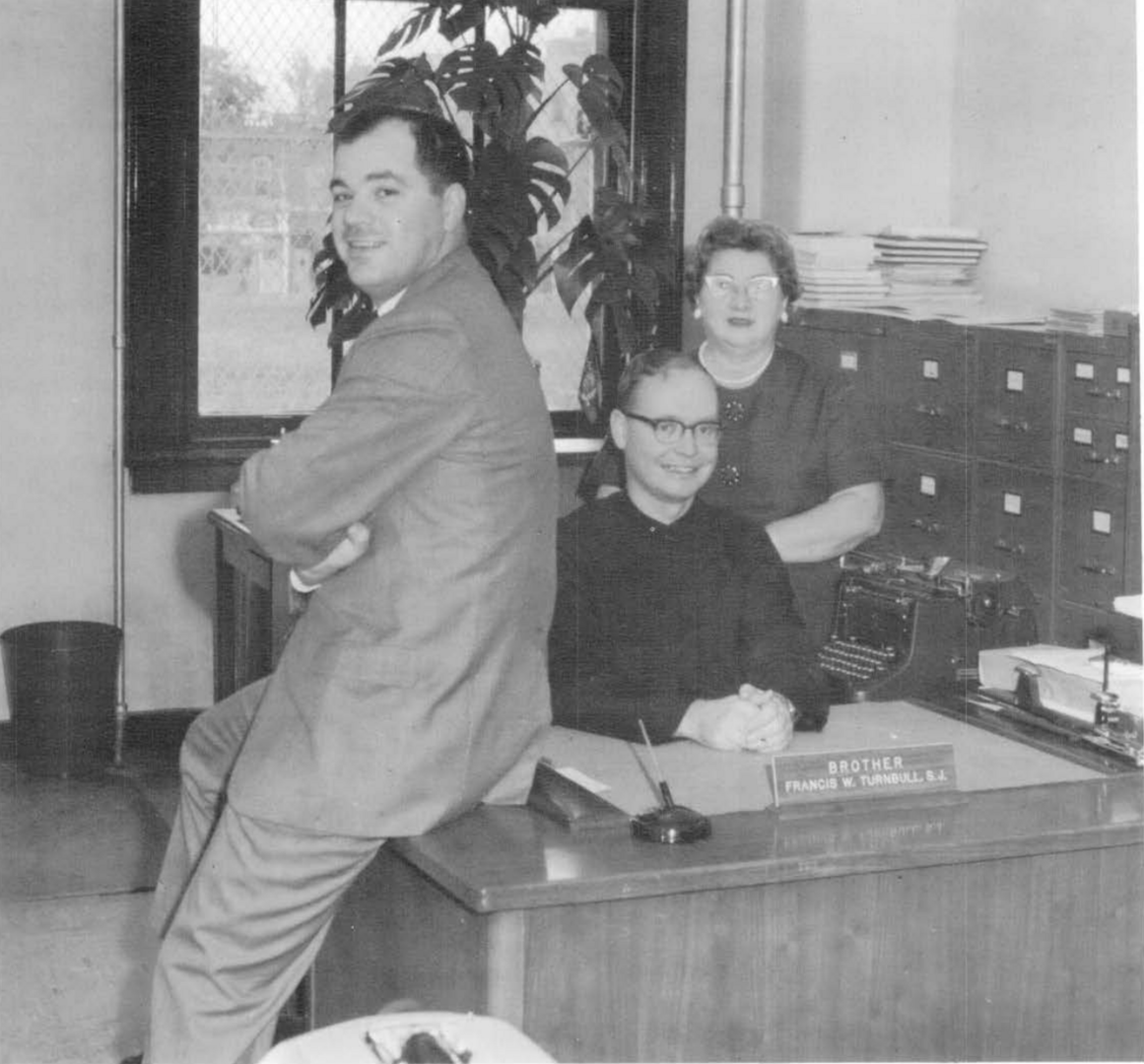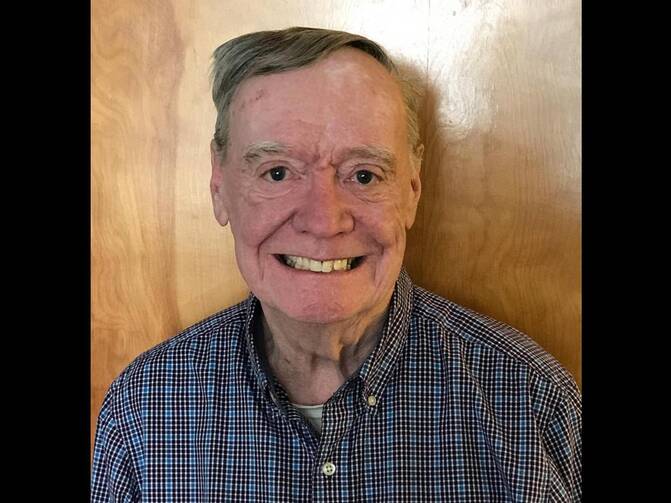The staff of America, the Society of Jesus and the city of New York all lost a good friend and a role model this week with the death of Frank W. Turnbull, S.J., on July 15, 2025. Frank, who served for 26 years all told at America as part of a lifetime of service as a Jesuit brother, is remembered as a humble, quiet and yet forceful presence to those who knew him during his 85 years of life.
Brother Frank was born in 1939 in Brooklyn. He graduated from Cardinal Hayes High School in the Bronx in 1957 (a few years before Martin Scorsese, a few years after Don DeLillo) and entered what was then the New York Province of the Society of Jesus at St. Andrew-on-Hudson in Poughkeepsie, N.Y., in 1961. He took vows as a Jesuit brother in 1963.
In 1965, Brother Frank was assigned to Brooklyn Prep as the assistant registrar (check out the photo of him as a 27-year-old pup at his desk). After Brooklyn Prep closed in 1972, Brother Frank worked for a year at Canisius High School in Buffalo and then for 11 years in a number of different capacities at St. Peter’s University in Jersey City, N.J. He took final vows in the Society of Jesus in 1975.

In 1984, Brother Frank came to America, where he worked as the assistant to the editor in chief and later as managing editor. America was a print weekly then, and the managing editor was tasked with keeping countless different literary pieces in motion at any given time as they made their way toward publication; Brother Frank had the quiet but firm temperament for the job. Brother Frank also worked for a year in 1993-94 in Benin City, Nigeria, at the Jesuit retreat house there.
In 1995, he became the executive assistant for the Jesuit Secondary Education Association in Washington, D.C. Four more years in Jersey City followed as the administrative assistant to the principal of St. Peter’s Prep.
After so many exiles, Brother Frank returned to the promised land in 2000, coming back to America as an assistant editor (though really the job was rather more than that). “While I hated losing him,” his boss at St. Peter’s Prep was quoted as saying in Brother Frank’s obituary, “I was delighted he went back to America, his first love.”
Brother Frank lived and worked at America for the next 15 years during an era of significant transition for the magazine. When he returned in 2000, he was given a typewriter and a guacamole-colored rotary phone; when he left the community in 2016, everyone had a cellphone, and the magazine had morphed into a multimedia enterprise. (Truth be told, Brother Frank never got rid of the typewriter.) In his time at America, Brother Frank served under four different editors in chief: George W. Hunt, Thomas J. Reese, Drew Christiansen and Matt Malone.
Named editor emeritus at America after his retirement, Brother Frank moved to the Jesuit retirement community at Murray-Weigel Hall in the Bronx in 2016, where he lived until his death on July 15, just short of his 86th birthday.
I first met Brother Frank in January 2004, when I arrived at America as an intern. Father Reese was the editor in chief; the youngest editor was a 44-year-old kid named James Martin, S.J. Brother Frank was a combination of assistant to the editor in chief and the production manager, chief proofreader, informal encyclopedia and wise if quiet office guru. Our longtime literary editor, Pat Kossmann, once estimated that Brother Frank worked 16-hour days.
One of my early tasks as an editor was compiling a history of the magazine, which entailed going through our author records for what was then almost a century of publication. Our system for keeping track of authors at the time involved Brother Frank typing the name and date of their article on the author’s index card, one of thousands that were stored in a huge bank of file cabinets that looked like an old library card catalog.
Brother Frank’s index cards were egalitarian in the extreme: I found it sort of flattering and very unsettling to discover that James T. Keane was in the same rubber-banded set as John F. Kennedy and James F. Keenan, S.J. Those cabinets were also a treasure trove of information—it could be a real treat to discover a famous author when riffling through the cards. After Brother Frank’s retirement and as part of the relocation of America's offices and the digitization of production, the cards were discarded, an unspeakable crime that neither Brother Frank nor I ever found the desire to forgive.
Brother Frank was a homebody. He knew the city like the back of his hand, but could nevertheless be found practically every night in the Jesuit community for Mass and dinner. One startling exception was a Saturday night in perhaps 2008 when Matt Malone and I were both associate editors at the magazine. Fed up with one thing or another at the office, we went out to Cassidy’s on 55th Street for a cheap dinner that turned into a marathon of complaining over a Guinness or two (or nine). Probably an hour or so into our uncharitable journey, someone we hadn’t noticed was there stood up from a table just on the other side of a pillar from us. It was Brother Frank. There was no way he hadn’t heard every single word.
And if you knew Brother Frank, you know what comes next: He never, ever breathed a single word of it. To anyone. Not even us.
Brother Frank never spent any money at all, as far as I could tell, with one hilarious exception: He enjoyed a Saturday visit to the O.T.B. What’s this? You have to be of a certain age to remember the shabby glory of New York City’s late, lamented O.T.B.s, the last of which closed in 2010. These “Off-Track Betting” parlors were located in grimy, smoke-filled storefronts throughout the city and were never not full of old men chain-smoking and staring at TVs showing horse racing all day long. You could place a quick bet and have a cigarette indoors in the O.T.B., the kind of place Aquinas would say men need in order to avoid more pernicious vices. Brother Frank liked to drop in on a Saturday to bet two dollars on a trotter while burning a quick one. Why not?
For many years, when America was still a weekly and primarily a print publication, the last task on the production checklist of Bob Collins, S.J., our longtime managing editor who succeeded Brother Frank in 1992, was to give the finished product to Brother Frank. He was the last person to read the whole book, cover to cover, before it went to print. Why? Because he was reliable, honest, thorough and trustworthy.
Rest in peace, Brother Frank.








